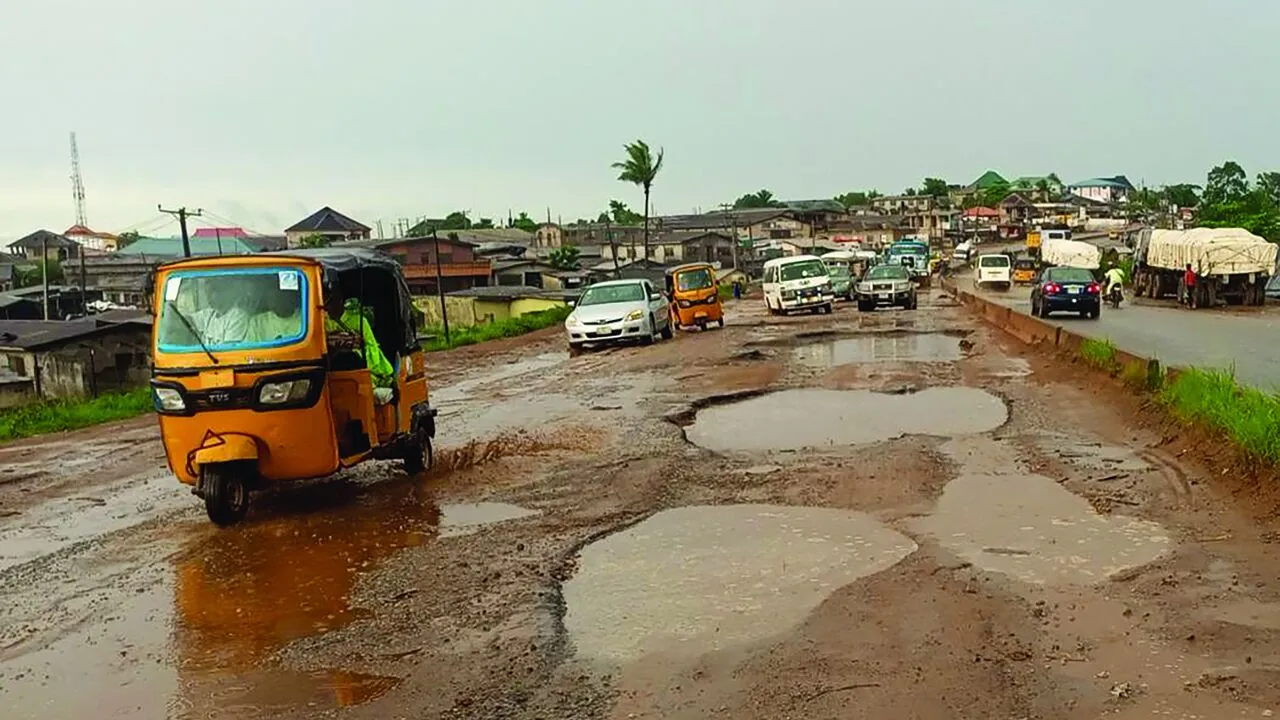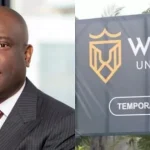...To get all news updates, Join our WhatsApp Group (Click Here)
Also Join our WhatsApp Channel (Click Here)
Gradually, the patience and expectations of road users plying the Lagos-Abeokuta expressway are turning to anger and frustration, as there seems to be no solution yet in sight to the untold hardship faced by motorists and citizens daily.
The road, awarded to Julius Berger Plc by the former President Olusegun Obasanjo in 1999 had suffered perennial setbacks over the years due to paucity of fund, forcing the contractor to abandon the road. Even, the government organ responsible for its maintenance, the Federal Road Maintenance Agency (FERMA), has also completely neglected it.
It is unfortunate that 20 years after, the road, a major artery, which runs through Lagos and Ogun states, has become worse than the contractors met it.
Indeed, the whole stretch from the Brewery bus stop, Abeokuta through Sango to Ile-Epo market, Lagos, is currently in a state of comatose as the road becomes death traps and albatross to all road users.
When the news broke last October that the Federal Government had approved the request of the Ogun State government to take over the construction of the road, there was a wild jubilation across the state that at least in a matter of months, their nightmare on the road would soon be a thing of the past.
The approval was announced by the Minister of Works, David Umahi, after the Federal Executive Council (FEC) meeting at the Aso Villa, Abuja, where it was announced that the state government can embark on the reconstruction of the dilapidated road and toll it, but alas, four months after, there is no sign that the state is ready for the task.
Before this period, Governor Abiodun in conjunction with his Lagos State counterpart, Babajide Sanwo-Olu had pleaded to take over the construction of the road but the requests were rebuffed by the administration of former President Muhammadu Buhari.
The minister said, “On permission to build federal roads, when such requests are made, we give approval within 24 hours but then there are conditions to be met – they must have to use the Federal Ministry of Works standard designs.”
The state Commissioner for Works and Infrastructure, Engr. Ade Akinsanya, who commended the governor for his resilience, declared that the state was ready to take on the project and end the many years of suffering of her people.
“The work will be accelerated so that delivery will be swift. We will give the best standard in the shortest time possible. We appreciate the minister for supporting our quest all along. Governor Abiodun is still working hard for more of this,” he added.
It is sad to note that between October last year and now, the road has further degenerated, especially with the torrential rainfall of last year, turning some of the potholes to craters and ditches of different sizes and depth.
Driving from Sango-Ota to Abeokuta, which normally takes about an hour, now takes about three to four hours depending on the day of the week and the time of the day. The Guardian investigations showed that many of the motorists now prefer driving through the Lagos-Ibadan expressway, to avoid the pain and agony of the stretch.
While this has led to series of robbery incidents that were either underreported or non-reported, especially in the night, investigations showed that between October and now scores of lives have been lost via auto crashes, attributed to the bad state of the road.
For instance, on September 10, 2023, two passengers died, while one person was injured in an accident at Ayedere, in Ewekoro Local Council. On December 29, a female adult was crushed to death by a truck at the Dalemo bus stop, Sango. Also, on January 13, 2024, one person died with three others injured in a devastating accident at the old tollgate, Sango, and many more.
When The Guardian went on the tour of the stretch from Abule-Egba, Lagos to Abeokuta last Thursday, observation showed that it is extremely sad times for motorists and other road users on the Sango end and Abeokuta stretch, which has degenerated beyond comprehension.
Passing through the deplorable road has become a source of great distress, as motorists now resort to driving against traffic once they are at the most deplorable axis.
Driving from the old tollgate through Joju to Iyana-Ilogbo is currently smooth. But from Onihale through Ilepa, Bosun Sawyer, Pakoto, Vulcaniser, Bungalow, Ewekoro to Abeokuta, the road is in a sorry state.
The stretch between Ilepa to Ifo, which shouldn’t take more than 20 minutes, now takes over one hour, 30 minutes. While the portion between the Apostolic Church convention ground, Ilepa junction to Ilepa second bus stop has deteriorated alarmingly in the last one year, the 45-metre stretch at the Bosun bus stop, inward Ifo, has worsened in the last seven months. The crater at the centre of the road is about 23 feet deep, covering the entire lanes.
The Pakoto axis is the worst hit. The stretch immediately after Ayede bus stop, to Folam bus stop, spanning about 1km, has been dotted with craters and potholes. The entire stretch is in a serious state of disrepair, precipitating gridlocks. The area is ridden with potholes and ditches that have taken over significant chunk of the road.
At the moment, only trucks, tippers, few cars and other bigger vehicles dare brave the road. Daily, precious man-hours are wasted on the axis. Beyond the stretch, from Arigbajo rail line through Apomu, Papalanto, Ewekoro, Itori, Wasinmi, Abule Mecho, Olomoore to Brewery junction, ditches of various sizes and depth are the common sight.
As a result, hapless motorists heading to either Ifo or Abeokuta often crawl for more than four hours or more, depending on the time of the day, for a journey that shouldn’t take more than one hour, 20 minutes.
To make the matter worse, almost on daily basis, trucks and heavy-duty vehicles crash at the bad spots. Many innocent lives have been taken in the last few months, while some who survive the accidents are living with scars.
Sadly too, between the Sango garage and Folam bus stop, countless number of pedestrians have been knocked down and killed by erring motorists who have resorted to driving against traffic to avoid the bad portions.
To say a lot of motorists have deserted the axis for the Lagos-Ibadan expressway, is to say the least as the road has not only become a death trap, but a shame to the Federal Government, that has left the road to degenerate to that level.
In October, before the FEC approval, the Senate President, Godswill Akpabio, after a grueling experience on the stretch, while on a visit to Ilaro, had promised to give necessary support to the state government on the reconstruction of federal roads in the state.
Akpabio, who said he insisted on driving to Ilaro to experience what people go through on the road every day, regretted that the trip took his team more than two hours to drive to Ilaro from Lagos.
Towards the end of last year, the Chairmen of Muslim Rights Concern (MURIC), Lagos and Ogun states cried out on the deplorable condition of the expressway, calling on the Federal Government to revisit the road.
The chairmen, Dr. Busari Jamiu Muhammad Ademola and Alhaji Jimoh Tajudeen Alao, in a joint statement, described the condition of the expressway as worrisome, dangerous, and inaccessible.
A commuter driver, Kazeem Ayepe, who lamented the current state of the road, said even if the state is not ready to embark on the project, the governor should have ensured the rehabilitation of the worst portions.
“Prior to commencement of the 2023 general elections, the terrible old tollgate stretch that was abandoned for close to a year was fixed in a matter of weeks. The governor extended the rehabilitation work through the Sango Motor Park, Joju bus stop, Conoil junction, to Ijako market. If that kind of drive is adopted as temporary measure, we’ll be better off than what we are facing now.”
A resident of Pakoto, Mr. Kunle Pedro, who works at the Apapa Wharf, said he was forced to squat with a friend till weekend when there was no respite in sight on the rehabilitation of the road.
He appealed to Governor Abiodun to make true his promise and start work on the road. “After all, he has been asked to toll it, this is not a matter of ‘we don’t have money’, whatever they spend, the state will recoup it. If this is the only dividend of democracy you can give us, please, do it now to stop the untimely death of the road users.”
The Guardian made several phone calls across to the Commissioner for Works and Infrastructure, Akinsanya on his mobile number 08147293211 on Thursday, to get update on plans to commence work on the road, but the calls were not picked. A text message was also sent across to him, but yet to reply as of the time of filing this report.
- The Guardian
You can get every of our news as soon as they drop on WhatsApp ...To get all news updates, Join our WhatsApp Group (Click Here)
Also Join our WhatsApp Channel (Click Here)

















